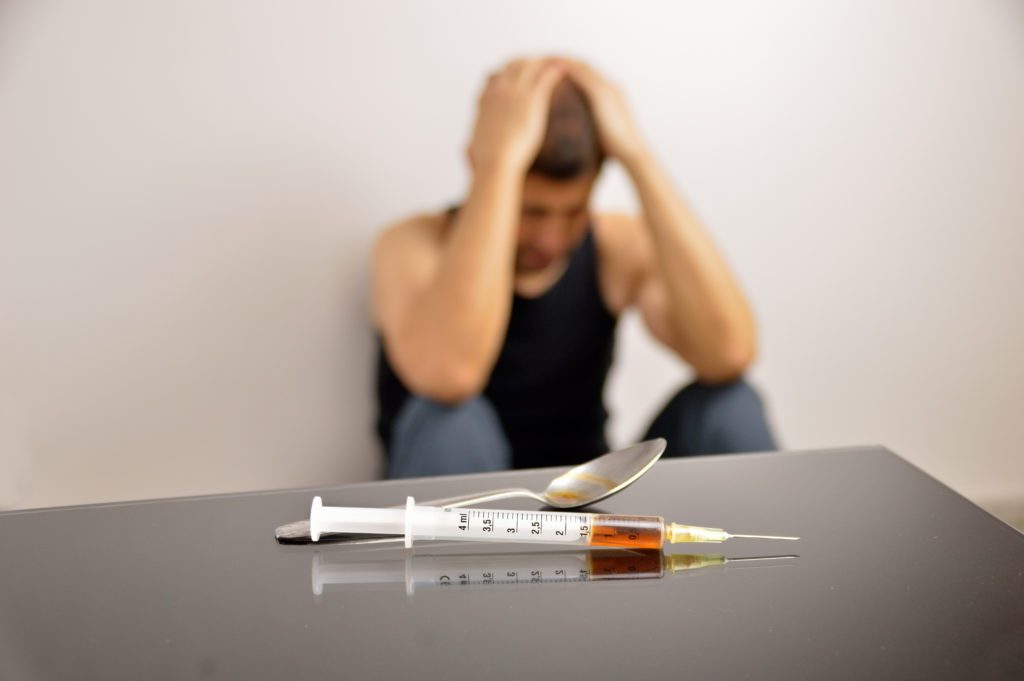Heroin is a highly addictive drug that can have devastating effects on the body. By learning more about its effects and how they affect the body we can help those around us who might be in need.
But what does heroin do to your body exactly? Let’s take a look.
What Does Heroin Do To Your Body
Heroin acts on the user’s pain and pleasure system by taking over opioid receptors and flooding the brain with dopamine.
The high potency of the drug causes psychological and physical dependence—making it extremely difficult for users to muster the strength they need to seek help and get sober.
Heroin’s effects on the body can be divided into three main categories.
- Short-term effects
- Long-term effects
- Withdrawals
Let’s examine each category to see how they differ from each other and in which ways they can affect people abusing heroin.
Short-Term Effects of Heroin In The Body
The short-term effects of heroin use on the body occur mainly when the user is under the influence of the drug and just after the high has worn off.
Consistently exposing the body to these short-term negative effects can eventually lead to long-term harm and possibly even death.
Heroin short-term heroin effects on the body include:
- A warm flushing of the skin
- Dry mouth
- Nausea
- Vomiting
- Severe itch
- A heavy feeling in the extremities
- Slow heart function
- Slow and/or heavy breathing
If the person using heroin experiences a slow heartbeat and a slowed down breathing they must immediately seek out medical help. These symptoms could lead to heart failure, coma, or permanent brain damage.
Long-Term Effects of Heroin In The Body
After prolonged use heroin addicts could suffer from long-term effects of heroin in the body. These symptoms might not be noticeable right away, but with time the warning signs from the body will begin to manifest.
Over time, the body builds tolerance, prompting users to take higher doses to achieve the same level of euphoria. Not only can this cause the users to overdose but it can also accelerate the decay of their bodies and the magnitude of their conditions.
One of the most dangerous long-term heroin effects on the body is brain damage. Severe neuronal and hormonal damage in the brain from long-term heroin use can be irreversible, and so can the damage that heroin causes to the liver.
Given some of the long-term effects of heroin on the body are irreversible, it’s best not to wait for the symptoms to show up to act. But rather, take action and seek sobriety as early as possible.
Other long-term heroin effects on the body include:
- Constipation
- Loss of teeth
- Respiratory problems
- Memory loss
- Weakened immune system
- Muscular weakness
- Collapsed veins
- Insomnia
- Risk of contracting diseases such as HIV/AIDS, Hepatitis B, and Hepatitis C
- Miscarriage
- Scabs
How Does Heroin Impact the Body During Withdrawals
The appearance of withdrawal symptoms in an addict is the greatest telltale of physical dependence to any substance. Withdrawal symptoms are adverse effects that occur when the addict stops taking a drug abruptly.
Heroin withdrawal symptoms tend to cause a great deal of pain and suffering in the addict and could be deadly if not managed properly.
If someone you love is experiencing withdrawals from heroin then it’s vital that they are taken into medical care or detox, as their well-being could be at risk.
Common symptoms of heroin withdrawal include:
- Excessive flow of tears
- Muscle aches
- Tremors
- Diarrhea
- Nausea and vomiting
- Dilated pupils
- Eye discomfort in bright lights
- Trouble sleeping
- Autonomic hyperactivity
- Irritable moods
- Depression and suicidal thoughts
- Anxiety
What to Do When You Spot Heroin Abuse Symptoms
Now that you know more about what heroin does to your body you might be better prepared to identify them in those around you.
But what should you do if someone you care for is suffering from heroin addiction?
It is vital that you act quickly if you know someone for whom heroin abuse is a problem.
You may want to look out for additional evidence such as drug paraphernalia which can include needles, pipes, small zip-lock bags, or burnt aluminum paper.
If you do find further evidence of abuse, then you should seek out professional help immediately.
How to Get Help Today
Our addiction experts at Veritas Detox can help you or your loved ones navigate the storm and find calm waters. Our holistic treatments, professional staff, and luxurious facilities offer the best chances of sobriety.
Contact Veritas Detox today and ask one of our admission experts about the next steps to get the help you or your loved ones need today.





